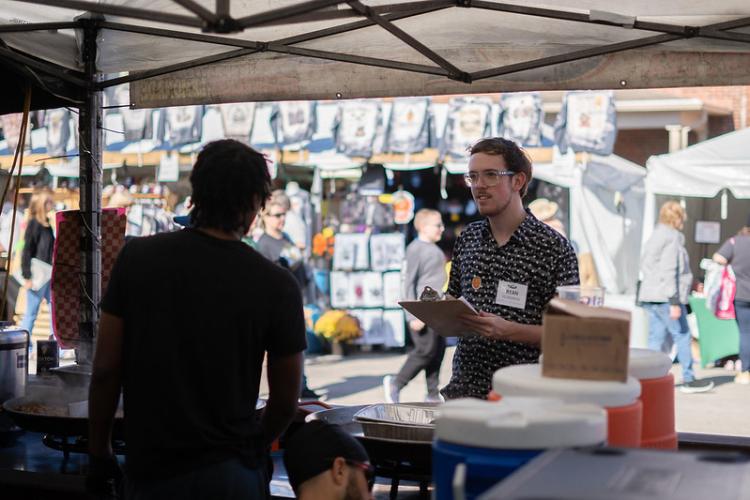
OHIO students driving change through research, service

For nearly two decades, the Voinovich Undergraduate Research Scholars Program has given Ohio University students a front-row seat to the real work of public service.
Housed at OHIO”s Voinovich School of Leadership and Public Service, the Voinovich Undergraduate Research Scholars Program places undergraduate students on faculty and staff-led research and community development projects—offering hands-on experience with immediate, real-world impact.
What began as a small initiative for Honors Tutorial College (HTC) students has grown into a campus-wide opportunity that not only helps students launch careers, but also expands the Voinovich School’s ability to serve communities across Ohio and Appalachia.
Dr. Anirudh Ruhil, associate dean at the Voinovich School and longtime director of the program, has been a guiding force behind its evolution. He leads recruitment, coordinates student placements and supports scholars throughout their time in the program.
“Scholars are treated like professionals from day one—many even meet with clients regularly,” Ruhil said. “This isn’t classroom learning. Scholars are doing real, applied work.”
The benefits, he added, extend well beyond the students themselves. By integrating undergraduates into active research and service efforts, the program significantly increases the school’s capacity to take on meaningful work.
Community partners gain access to fresh insights and timely analysis. Faculty receive valuable research support. And students develop a deep understanding of the region they’re serving—often staying connected to that work even after graduation.
“It’s a full-circle model,” Ruhil said. “They’re not just learning—they’re contributing. And what they contribute adds real value, from project outcomes to community relationships.”
Gaining knowledge, experience and confidence
Carys Voinovich, an undergraduate scholar working in the dean’s office, hadn’t originally planned on joining a research program. As a philosophy major with plans for law school, she wasn’t sure how the position would fit her path—but found it transformed her perspective.
“I’ve learned how to take big ideas and boil them down into something actionable,” she said. “And honestly, I’ve just become more confident putting myself out there. It’s daunting to have that freedom and responsibility sometimes, but then I realize—‘I can figure this out.’”
One of the most meaningful aspects of her experience has been connecting with other scholars—students working in different areas but united by a shared sense of purpose. Through both casual conversations and structured interviews with fellow scholars, Voinovich gained a deeper appreciation for the program’s impact.
“They’re so passionate, and you can see how much it matters to them,” she said. “Whether they’re doing environmental work, community outreach, or research, they’re driven by a sense of purpose. A lot of students outside the program don’t have that kind of experience, and hearing their stories just makes me even more grateful to be part of this.”
Ryan Humeniuk, works with the Voinovich School’s economic development team. He joined the program to gain a closer view of how local policy and planning shape everyday life.
“A lot of the time you hear about economic development in an international context,” he said. “But I wanted to see how it plays out here, in communities around Ohio and Appalachia.”
That local lens, he said, made the work more tangible and more urgent. His projects, which support small businesses, workforce initiatives and regional planning, revealed the direct connection between research and real lives.
“It’s not abstract here. The work we’re doing has the potential to directly help people," he said. "That’s what drew me in.”
OHIO students play critical roles in research projects
Humeniuk also highlighted how the program respects both the academic and professional sides of student life. Scholars are expected to contribute meaningfully to projects, but they’re also given the flexibility to manage their course loads and other commitments.
“They understand when we need time for schoolwork,” he said. “But they also treat us like professionals. It’s a great balance.”
Faculty and staff say that balance is what makes the program so effective. Scholars don’t just observe—they contribute. Their energy, curiosity and skill help fill critical gaps on projects that might otherwise be limited by staff capacity. Their presence often unlocks new potential, allowing teams to pursue work that would have been out of reach.
With additional funding, program leaders hope to bring more students into the fold—expanding both the number of scholars supported and the reach of their impact in the region.
“This isn’t just a program,” Ruhil said. “It’s an investment in the future of our region.”
